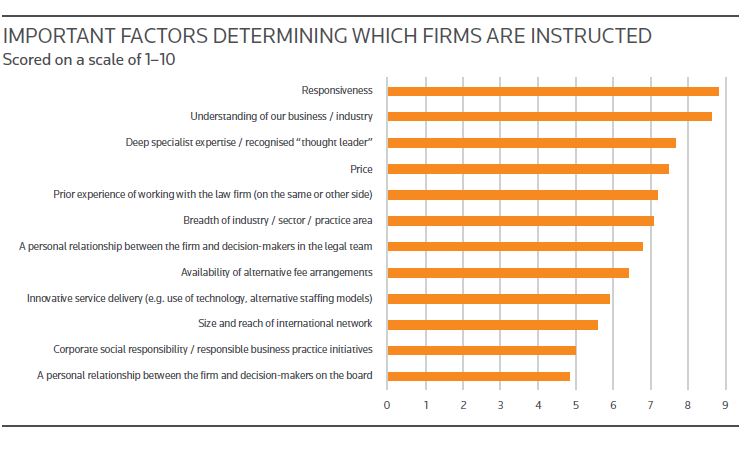Law firms invest huge sums trying to differentiate themselves. Some plough
thousands of pounds into website redesigns and marketing initiative. Others invest in innovative technology that improves service delivery. For some firms, differentiation is just about offering the most competitive hourly rates.
But what do in-house teams value most?
This very question is explored in our recently published report, Standing out from the Crowd. The report is based on a survey of more than 250 in-house lawyers, the majority of which were SMEs.
The findings make it clear that businesses of this size value law firms that are responsive, and who are prepared to invest the time to really understand their business. These are the two factors that far outweigh others when it comes to determining which firms are instructed.

Back to Basics
Let’s look have a closer look at responsiveness. It should be easy, right? Agree a deadline with a client? Stick to it. Receive an email from a client about an ongoing matter? Reply swiftly, at least acknowledging the question has been received. Asked that the response be sent in a certain format? Just do it. And while all of this might sound simple enough, our report indicates that some law firms are failing to get this right. But what exactly did our respondents mean by responsiveness? This is also explored by the report in more detail.
Does good responsiveness just equate to a rapid response?
Not necessarily, according to our series of interviewees. In-house teams realise that certain matters will take time to resolve. What’s most important is that firms be transparent about how long a certain matter will take and do not miss deadlines. Of course, sometimes matters can become more complex once the work begins and so may take longer than initially expected. In this case it’s imperative for firms to communicate this early to clients.
Find Out More
Standing Out from the Crowd explores responsiveness and how it could be a differentiation factor. It also explores other potential differentiators such as price and technology. The report is particularly useful as it contains lots of real life examples that fully illustrate the findings. You can access the full report here.
